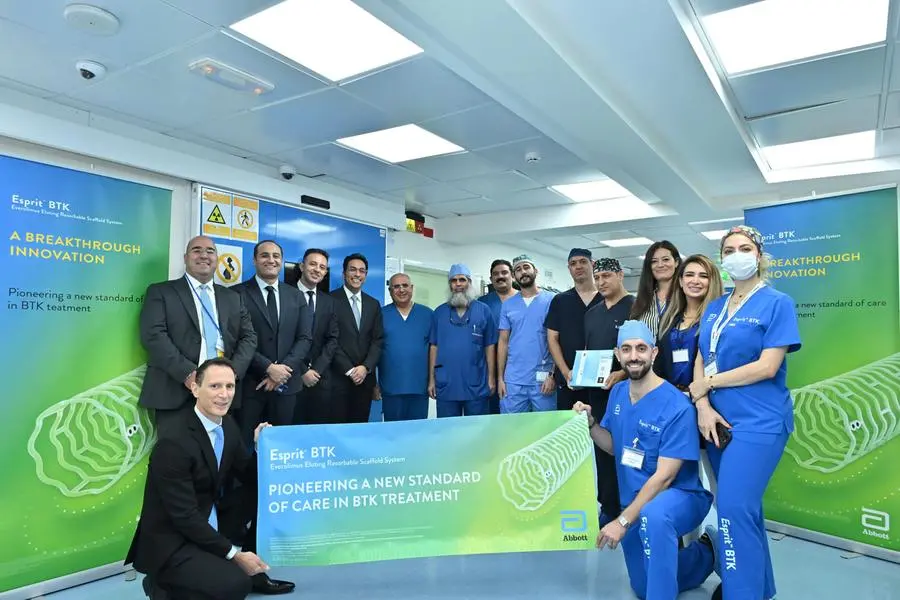PHOTO
- Abbott's Esprit™ BTK Everolimus Eluting Resorbable Scaffold System (Esprit™ BTK System) offers a new option for people with the most advanced form of peripheral artery disease (PAD) for arteries below-the-knee (BTK)
SHARJAH, UAE – Al Qassimi Hospital today announced it successfully implanted the first EspritTM BTK Everolimus Eluting Resorbable Scaffold System (Esprit™ BTK System) in the United Arab Emirates. Esprit™ BTK is a first-of-its-kind dissolvable stent in the UAE for people with chronic limb-threatening ischemia (CLTI) below-the-knee (BTK).
Approved by the U.S. Food and Drug Administration (FDA) in April 2024, the EspritTM BTK System is designed to keep arteries open and deliver a drug called everolimus to support vessel healing prior to dissolving.
The EspritTM BTK System is comprised of materials similar to dissolving sutures. Once the blockage is open, the device is implanted through a catheter-based minimally invasive procedure. The scaffold helps heal the vessel and provides support until it is strong enough to remain open on its own.
Dr. Arif Al Nooryani, Director of Al Qassimi Hospital in Sharjah, highlighted that the successful implantation of the innovative Esprit™ stent by the hospital's medical team represents a remarkable achievement and a significant milestone in the advancement of the healthcare sector in the UAE. This stent provides a groundbreaking therapeutic solution that can enhance the quality of life for patients by addressing below-the-knee arterial blockages, which frequently lead to amputations and high mortality rates within five years of treatment. He noted that this accomplishment underscores the Emirates Health Services' commitment to improving healthcare quality and making a transformative impact on individuals' lives through an innovative approach rooted in advanced medical technology. This initiative aligns with the vision of the UAE's leadership and the goals of the "We the UAE" 2031 vision and the UAE Centennial 2071, which emphasize fostering innovation across all critical sectors, including healthcare.
“Today the UAE achieves a new milestone for people with chronic limb-threatening ischemia below-the-knee,” said Samih Al Mawass, Division Vice President for Abbott Vascular business, EMEA. “Being the first country across Europe, the Middle East and Africa to successfully implant Abbott’s Esprit BTK scaffold at Al Qassimi Hospital is yet another testimonial of the Emirates Health Services’ commitment to advance healthcare standards and bring patients new possibilities through cutting-edge technologies.”
More than 20 million people worldwide are living with chronic limb-threatening ischemia1, from which only 10% are diagnosed2. There have been limited treatment options approved for blocked arteries below the knee, resulting to high amputation and 5y mortality rates3,4
Chronic limb-threatening ischemia below-the-knee is a severe form of PAD that occurs when arteries become clogged with plaque, and blood flow and oxygen can't reach the lower leg and foot.
1 Song, P., et al. Global, regional and national prevalence and risk factors for PAD in 2015. Lancet Glob Health 2019;7e1020-30
2 Using the epidemiology of critical limb ischemia to estimate the number of patients amenable to endovascular therapy Arash Fereydooni , Jolanta Gorecka and Alan Dardik;Vascular Medicine 2020, Vol. 25(1) 78–87.
3 Fanaroff, A., et al. Development and Description of a National Cohort of Patients With Chronic Limb-Threatening Ischemia. 2 (2023) 100982
4 Mustapha, J., et al. Critical Limb Ischemia: a Threat to Life and Limb. Endovascular Today. May 2019 Vol 19, no 5
About Abbott
Abbott is a global healthcare leader that helps people live more fully at all stages of life. Our portfolio of life-changing technologies spans the spectrum of healthcare, with leading businesses and products in diagnostics, medical devices, nutritionals and branded generic medicines. Our 114,000 colleagues serve people in more than 160 countries.
Connect with us at www.abbott.com and on LinkedIn, Facebook, Instagram, X and YouTube.




















